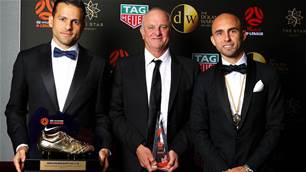ADRIAN Deans, the Australian author of Mr Cleansheets, tells us why he wanted to tell the story of an aging Australian keeper who nearly makes the big time... at 39 years old.
The work of footballing fiction, which boasts back cover endorsements from Lawrie McKinna and FourFourTwo columnist Simon Hill, centres on Sydney-based stopper Eric Judd who finally gets a trial with Manchester United six days before his 40th birthday, but things don't go to plan.
Eric then finds himself in England, but far from a dream move, he encounters all manner of villains: murderous football hooligans, Irish mafia, dodgy agents, beautiful pop stars, international terrorists and a range of supporting players with any number of hidden agendas.
We sat down with Deans, who grew up on the outskirts of Sydney's northern beaches, to discuss the motivation behind the book, matching football's real-life drama in fiction and why Lawrie McKinna is already demanding a sequel!
What was the inspiration behind the book?
From the very beginning I had the idea of the goalkeeper (Eric Judd) who everyone thought was too old. Having played in goals myself at a reasonable level, I knew that keepers don't reach their peak until their early thirties, and there are plenty of examples of professionals who played into their forties. I wanted Eric to be as old as it was possible for him to be so that his eventual adventures in England were just on the edge of plausibility. In fact, in the first draft he was 42, but my publisher Ian Syson convinced me to knock a couple of years off. He was probably right.
Football books often centre on free-scoring strikers or creative midfield gems, how do you think readers will react to reading about a stopper's fortunes?
In a way, I've got the best of both worlds. I do have the free-scoring striker (Jaffa) and the midfield gems in the book (Billy, Trevor, the Santos brothers) so I get to explore those aspects of football, but as Eric himself says: a keeper's an individual. There's only one goalkeeper in the team and he sees everything. I wanted the story to be (mostly) told as a first-person narrative and it's only a goalkeeper who can do that. Field players are too constantly in the play (on and off the ball) to believably be narrating as they go.
The other thing, of course, is that Mr Cleansheets is not just about football. The kind of scrapes and adventures that Eric blunders into could happen to anyone, so from that perspective, it doesn't matter where he plays.
What do you think makes Mr Cleansheets unique as a football book?
That's a hard one - especially as I haven't read that many football novels. Most football books I've read have been biographies (I sincerely urge all of you to read Craig Johnston's Walk Alone - utterly brilliant). There was of course Nick Hornby's Fever Pitch, which was pretty good, and The Damned United, which was excellent, but they were serious works. What I wanted to create was the ultimate, escapist holiday read (which is how Lawrie McKinna describes Mr Cleansheets, bless him). For me, the hallmark of good escapist literature, is that it sets up a pleasurable expectation in the reader, so the reader's thinking: "Oh yeah, I can see where this is going... this is gonna be good." But the book then delivers far more than the reader anticipated and leaves them totally exhilarated. It's not for me to say whether I've achieved that with Mr Cleansheets, but that's what I aimed for.
I guess one thing that makes Mr Cleansheets unique is Eric's voice. You've got all these amazing things happening on the other side of the world, but Eric - mild-mannered removalist from Sydney - takes the whole thing in his stride and tells his story with a gently humorous Aussie style.
The book has themes and subthemes which potentially linger with the reader too. The main theme, of course, is that it's never too late to chase a dream, irrespective of the obstacles or popular prejudices, but there's also a major anti-racism subtext which few have mentioned so far... which I hope means I've woven it into the story without being too preachy. I hate preachy novelists.
It's difficult to recreate the drama of such a naturally dramatic sport as football in fiction, how does Mr Cleansheets manage it?
That's a great question. First off, I'd never suggest that the action in Mr Cleansheets could surpass real life, but it was important that the action be believable and do justice to the rest of the story. I have read a few football stories in the past, mainly written for kids, and they're all pretty unsatisfying when it comes to blow by blow accounts. If there was one thing I definitely wanted to achieve in Mr Cleansheets, it was descriptions of football that were tangible, memorable and real. To my eternal joy, the male feedback so far has largely focused on how real the football atmosphere feels - so what's the secret?
I can't put my finger on it exactly. To some extent, it's simply a manifestation of my writing style distilled from my decades of experience playing and watching football. But on reflection, I can deconstruct part of why it works.
You also need to avoid too many blow by blow descriptions of the play. It's best to concentrate on the atmosphere; what people are thinking and saying; what the crowd are doing; what other implications for the story there are in the on field/off field action. The Ipswich game in the book is nearly 30 pages long and is a powerfully intense passage - but there's very little football described really, and what there is comes from numerous perspectives: Cleansheets; the TV commentator; Baz and Bones.
Writing about football is very similar to writing about sex. I really enjoy the bonking scenes in Mr Cleansheets and the same rules apply. Context: the first bonk scene between Eric and Doreen would be nothing without the fact that the reader has got to know them, likes them and desperately wants them to do it. There is some blow by blow description (pardon the pun) but once again it's the atmosphere that matters.
Football also needs to be different. The context part of that is simple - you'll write a reserves game in the league very differently from the FA Cup Final. But the action, sequence and type of scoring etc is hard. You have to really put yourself in the game and actually see, feel and hear it happening around you - adding in the many subtle nuances from your own experience - the smell of the rain and fresh mown grass; the feel of wet hair in your eyes and on the back of your neck; the bitter-sweet pain of your scrapes and bruises after the game. That will give it the visceral flavour, but you still need to give the reader a different experience every time, which makes sense within the world of the book, and (as far as reasonably possible) adds to the plot and characterisation. I've had a few readers tell me they were disappointed that they didn't get full descriptions of the games between the fourth round and the final but - give me a break! The book would have been a thousand pages long!
And Lawrie McKinna is already demanding a sequel...
Anyone getting to the end of Mr Cleansheets will appreciate the need for a sequel - which I have started writing. If it all goes to plan there will be two sequels - a trilogy no less - the last volume of which will be set partly in Australia and partly in Asia when Mr Cleansheets comes home to play in the A-League.
Mr Cleansheets is published by Vulgar Press, distributed by Dennis Jones Australia and is available in all good book stores.
Related Articles

Sydney FC: Bobo and Adrian, what now?

McKinna: Moss tops for Mariners












